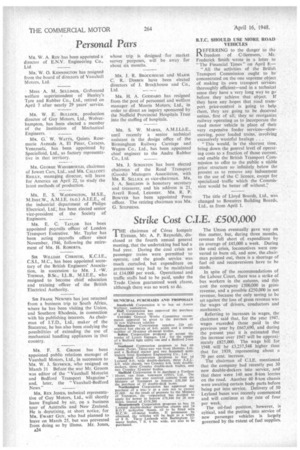Strike Cost C.I.E. £500,000
Page 26

If you've noticed an error in this article please click here to report it so we can fix it.
THE chairman of COras Iompair Eireann, Mr. A. P. Reynolds, disclosed at the fourth annual general meeting, that the undertaking had had a bad year. During the coal crisis no passenger trains were permitted to operate, and the goods service was much curtailed, but expenditure on permanent way had to be maintained at £14,000 per week. Operational and traffic staffs had to be paid, under the Trade Union guaranteed week clause, although there was no work to do.
The Union eventually gave way on this matter, but, during three months, revenue fell short of. expenditure by an average of £45,000 a week. During the coal crisis, locomotives were convetted to burn oil, and now, the .chairman pointed out, there is a shortage of fuel oil and reconversions have to be made.
In spite of the recommendations of the Labour Court, there was a strike of bus workers in the autumn, and this cost the company £500,000 in gross revenue, and a possible £250,000 in net revenue, because the only saving to be set against the loss of gross revenue was the wages of drivers, conductors and mechanics.
Referring to increases in wages, the chairman said that, for the year 1947. wages exceeded those paid in the previous year by £667,690, and during the present year it is estimated that the increase over 1947 will be approximately £825,000. The wage bill for 1948 will be £3,237,548 higher than that for 1939, representing about a 70 per cent. increase.
The chairman of C.1.E. mentioned that the company had recently put 30 new double-deckers into service, And that there were 140 new 8-ton lorries on the road. Another 60 8-ton chassis were awaiting certain body parts before being put into service. Delivery of 50 Leyland buses was recently commenced and will continue at the rate of four per week. The oil-fuel position, however, is critical, and the putting into service of new passenger vehicles is largely governed by the extent of fuel supplies.












































































